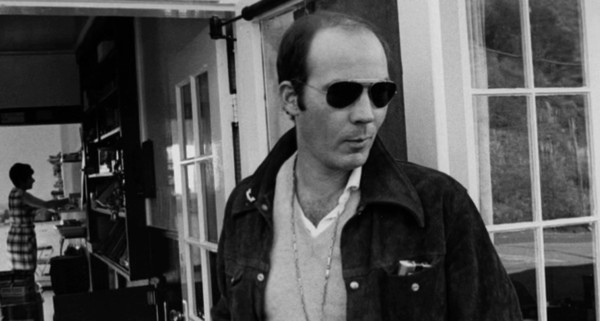Director: Alex Gibney,
Watched in: Theater,
Rating: 2.5/5.
Gonzo: The Life and Work of Hunter S. Thompson, gets the “life” part of its title down on film. The other half, the work part, you’ll have to find out yourself. Read Hells Angels or Fear and Loathing in Las Vegas or The Great Shark Hunt to discover what made Thompson a maverick journalist. You you won’t get much of a sense of it from the movie.
Gonzo is a lively, fast-paced, mostly enjoyable tour of the signposts that marked the manic myth of Thompson’s life: the early days riding with the Angels; his work for Rolling Stone; his fear and loathing on the campaign trail of the 1972 McGovern/Nixon election; his love of booze, drugs, guns, and women; his audacious tweaking of the rules of journalism; and his descent into caricature as a cartoon figure in Doonesbury.
There are plenty of interviews with the likes of Jimmy Carter, George McGovern, Pat Buchanan, Jimmy Buffet, his two wives, Jan Wenner, the publisher of Rolling Stone, and Timothy Crouse, author of the classic The Boys On the Bus. There are fascinating clips from Thompson’s appearance on the game show To Tell The Truth, from a little seen documentary called Breakfast with Hunter, from the Bill Murray movie Where the Buffalo Roam, and from the Terry Gilliam directed version of Fear and Loathing in Las Vegas, staring Johnny Depp and Benicio del Toro. Yes, it’s all there: the wild and crazy life of Hunter S. Thompson, revolutionary writer, drunk, and self-fulfilling failure. But where are the words? Where is the trenchant political analysis? Where are the penetrating zingers that stabbed at the heart of darkness in the American dream?
Yes, there are a few excerpts from Thompson’s work, read by Depp, but like the Gilliam fiasco that exploited Thompson’s fiery, kinetic prose with dumb, trippy, psychedelic visuals, this documentary hardly ever gives the words a chance to breathe. The director Alex Gibney, who has made several high-profile docs, including Enron: The Smartest Guys in the Room, enjoys what looks like a nice budget for this movie.
Judging by the soundtrack alone, a selection of not very original pop-rock hits, he seems to be in a rush to spend every penny on amping up the onscreen audio-visual assault. Songs come and go with barely an impact; soundbites are squeezed out in brief local-news sized bits; graphics are layered over moving pictures; still photos are animated and fractured, and, before they register, replaced with another barrage of bites and bits. Most documentary filmmakers have to make do with the change they can find in the lint at the bottom of their pockets; but others, like Gibney, have the funds to play around with Adobe After Effects, which can take a perfectly composed and shot archival photograph and turn it to Cubist mush.
What all of this fancy dancing does is to reduce what made Thompson great—his acerbic, bullseye take on the naked emperors running the kingdoms of commerce and politics—to sardonic one-liners. Reading Thompson as I did, on long drug-fueled road trips, or sitting by the pool with a drink in your hand or sweat streaming down your back in some tropical motel, is to absorb the work of a one-of-a-kind, witty, rebel with a cause. It is sad he became a joke, and it sure is funny and weird his ashes got shot out of that rocket at his funeral, and it’s too bad that Gonzo: The Life and Work of Hunter S. Thompson, couldn’t figure out a way to encourage you to look past the myth, past the man, and just, you know, read his shit. Thompson’s life was a mess, and the movie is a mess, but for a brief, shining time in the ‘60s and ‘70s, he was a writer to be reckoned with.

